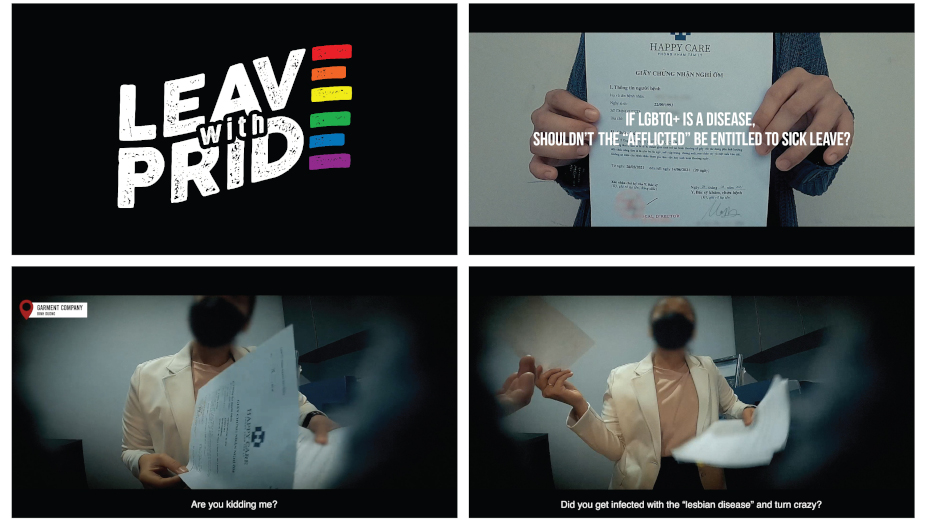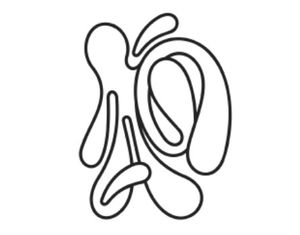
Using Sick Leave to Show That Being LGBTQ+ Is Not a Disease in Vietnam

Over 30% of Vietnamese people believe that being LGBTQ+ is a disease, which is only part of the widespread discrimination and stigmatisation of the community in the country. MullenLowe Singapore and the Institute for Studies of Society, Economy and Environment (iSEE) in Vietnam have partnered to highlight these unnerving numbers in their new campaign ‘Leave with PRIDE’.
The campaign seeks to petition the World Health Organisation (WHO) to affirm that being LGBTQ+ is not a disease and to educate audiences in Vietnam on the risks imposed on LGBT folk through these forms of discrimination. The ‘Leave with PRIDE,’ following the belief that being LGBTQ+ is a disease, suggests that if this truly is the case, people from the community should be entitled to sick leave.
Being offered valid medical certificates from practising doctors, LGBTQ+ volunteers took part in the campaign to ask their superiors at work for their entitled sick leave. Their reactions were secretly taped and included in the film, as part of a four-week social campaign in November - Pride Month in Vietnam. LBB’s Zoe Antonov spoke to MullenLowe Singapore’s creative team and iSEE about the significance of this campaign and the LGBTQ+ liberation movement in Vietnam.
LBB>This campaign is incredibly brave and deals with a seriously pressing issue within Vietnamese society. What exactly probed the start of the campaign and what conversations did you have around it?
MullenLowe Singapore & iSEE> It started from an article on a Vietnamese social platform about how a teacher told her student that she was sick with the homosexual “disease” and urged her to go and seek medical help. We were shocked by this and upon further investigation, realised the issue was much more prevalent than we thought. In fact, it was significant enough for iSEE to regard it as the next big hurdle towards a more accepting society.
LBB> What kind of research went into the beginning stages of the campaign - to get a clearer picture of Vietnam’s attitude towards LGBTQA+ issues - and what findings came out of it?
MullenLowe Singapore & iSEE> We spoke with various people from the LGBTQ+ community (under the veil of anonymity) as well as medical professors to understand what the prevailing, misinformed perceptions from society were. Through this, we discovered absurd and shocking things some did to ‘correct’ a family member belonging to the LGBTQ+ community.
For example, there was a parent who hired a guy to rape his own daughter, thinking that it would ‘cure’ her of being lesbian. So many stories and acts one wouldn’t believe still happen in one of the world’s most progressive economies.
LBB> Why is it important to launch the campaign now?
MullenLowe Singapore & iSEE> Over the last two years, the world had rightfully focused on battling a real illness in COVID-19. But it seemed that while this was happening, the battle against a perceived one had also been intensifying. Discrimination both online and off had become even more widespread. And misinformation was at the heart of it – people believed that being LGBTQ+ is a disease.
With respect to the pandemic, we had to pick the right time to try and shine a light on our cause, which is why we launched the campaign in November, Pride Month in Vietnam. Thankfully, COVID-19 cases have shown signs of slowing down in this month, giving us a window to talk about a perceived health problem towards a marginalised part of Vietnamese society.
LBB> The anonymous volunteers in the film put themselves in very vulnerable situations in order to provoke a conversation. Was it difficult to find them and to carry out the undercover filming? And does this highlight a completely new issue in the workplace - namely the way the bosses treat and speak to their staff?
MullenLowe Singapore & iSEE> It was definitely not an easy task. Just finding volunteers itself proved a massive ask because it’s such a sensitive issue.
Some of them had fears, as their family didn’t know about their gender identity. They were afraid it would open up a can of worms in their personal life. Fortunately, we were able to get a few of them to facilitate the experiment for us. Their belief in the project’s aim outweighed their apprehensions.
And it does also say something about how bosses treat their staff. We simply wanted to present the superiors’ reactions within the context of bigotry and discrimination against the LGBTQ+ community.
LBB> This is the 9th Pride Month in Vietnam, what is the conversation in the advertising scene during the month?
MullenLowe Singapore & iSEE> These days, the conversation mostly revolves around the pandemic and how Vietnam, like the rest of the world, can mitigate its devastating effects. And rightfully so. Which is why a lot of Pride efforts have been respectful of this context. Many campaigns and efforts have been moved up and concentrated within the month of November (Pride Month in Vietnam), so as not to take too much attention away from the pandemic. But that’s not to say that the Pride movement is slowing down within the country. More than ever, people are encouraged to come out, celebrate and be proud of who they are.
LBB> Do you think much progress has been made for the LGBTQA+ community in Vietnam in the past few years and what role does advertising and the media play?
MullenLowe Singapore & iSEE> Vietnam has, indeed, come a long way in fighting for the cause of the LGBTQ+ community. This is evidenced by the many LGBTQ+ organisations working in multiple cities and provinces across the country to provide direct support to members of the community in need, particularly with regards to discrimination and harassment in daily life.
In media and advertising, LGBTQ+ representation has been on the rise, seen in how more brands now partner with LGBTQ+ influencers and release products with members of the community in mind. All these go a long way in bridging the community and the general public.
But at the same time, we still have a long way to go. For instance, positive changes in the legal framework are only as good as its implementation. And perhaps we could do well to move past the ‘any representation is good representation’ mindset with regards to media and advertising. A more critical, thoughtful examination of how the community is portrayed would help, with simple questions like, “Will this portrayal of a feminine gay man do more harm than good,” or “Is this how LGBTQ+ people feel and act in real life,” going a long way towards a more inclusive, realistic representation.
LBB> What have audiences’ reactions been towards the campaign? And how has the World Health Organisation reacted?
MullenLowe Singapore & iSEE> So far the reaction has been very encouraging. Through our petition, we have surfaced over 3000 comments and personal stories. And it’s not been a week. Many were worried about the discrimination they witnessed and even mentioned far worse incidents happening around them. Which, perhaps, informs the urgency of rousing public support in ending this stigma.
As for the WHO, the plan is to engage them only when we have enough support from the public. We believe that an official statement in affirming that “LGBTQ+ is not a disease” will go a long way in debasing the misinformation leading to discrimination of the LGBTQ+ community.
LBB> Any final thoughts?
MullenLowe Singapore & iSEE> Please watch the experiment – it’s available online in both English and Vietnamese, and the follow-up interviews with medical professionals and counsellors – as allies, we must arm ourselves with good information. And then, of course, sign the petition – we need to encourage action.













